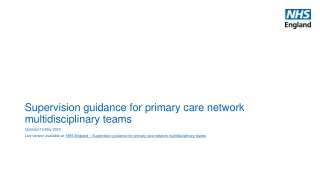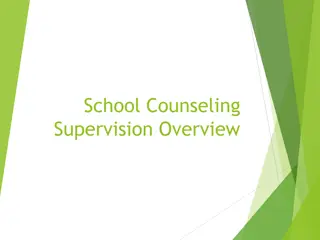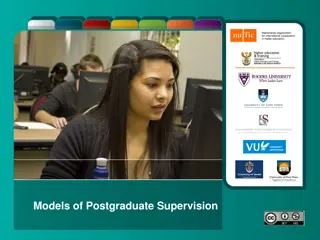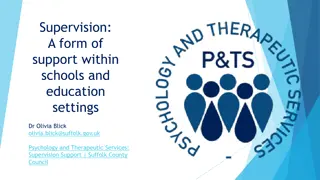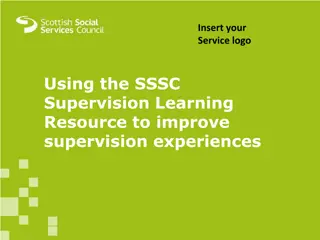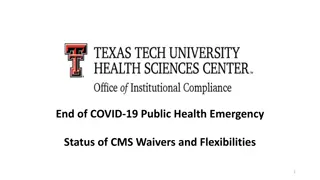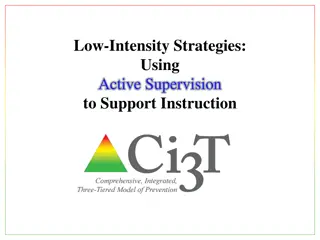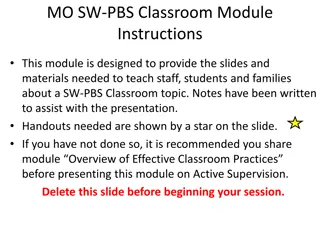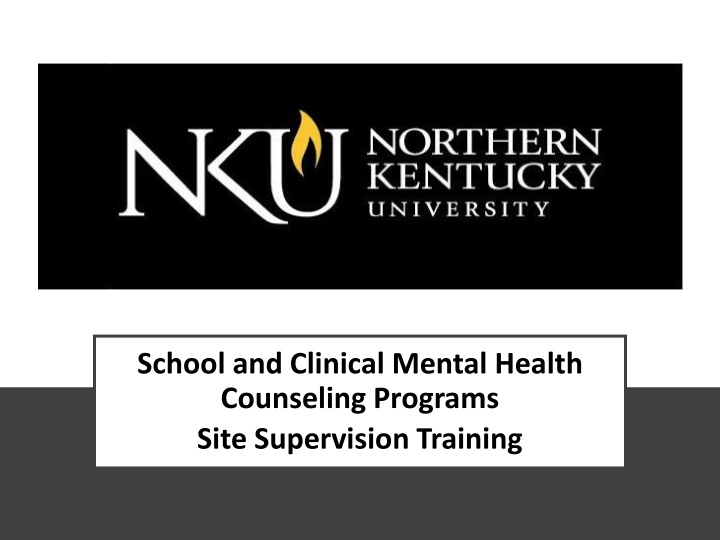
Site Supervision Training for Mental Health Counseling Programs
This presentation outlines the practicum and internship requirements for students enrolled in School and Clinical Mental Health Counseling Programs. It covers the expectations of site supervisors, legal and ethical concerns, and provides an overview of counseling supervision. Students are expected to complete a set number of hours in professional counseling experience, attend supervision sessions, and meet with site supervisors regularly. Recommendations are also provided for gaining individual counseling experience during the practicum. Internship requirements are detailed, specifying the number of hours needed and the types of counseling activities required.
Download Presentation

Please find below an Image/Link to download the presentation.
The content on the website is provided AS IS for your information and personal use only. It may not be sold, licensed, or shared on other websites without obtaining consent from the author. If you encounter any issues during the download, it is possible that the publisher has removed the file from their server.
You are allowed to download the files provided on this website for personal or commercial use, subject to the condition that they are used lawfully. All files are the property of their respective owners.
The content on the website is provided AS IS for your information and personal use only. It may not be sold, licensed, or shared on other websites without obtaining consent from the author.
E N D
Presentation Transcript
School and Clinical Mental Health Counseling Programs Site Supervision Training
This presentation will cover: 1.Practicum and Internship Requirements 2.Expectations of Site Supervisors 3.Legal and Ethical Concerns 4.Overview of Counseling Supervision
Practicum and Internship Requirements
Practicum Students enrolled in the practicum course are expected to complete at least 100 hours of professional counseling experience. At least 40 of the 100 hours must be in direct service counseling activities with individuals and/or groups. Of the 40-direct hours, at least 20 must be completed in an individual counseling setting.
Practicum (contd) Students enrolled in the practicum course are expected to: Attend weekly 90-minute group supervision sessions facilitated by a university supervisor. Attend weekly 60-minute individual or triadic supervision sessions facilitated by a university supervisor. Meet regularly with site supervisor, and immediately seek supervision in unusual, urgent, or emergency situations.
Practicum. Recommendations: It is recommended students spend approximately 8-12 hours on-site a week To gain individual counseling experience we recommend students have at least 5 consistent individual clients/students to meet with
Internship Students enrolled in internship are expected to complete at least 600 hours of professional counseling experience (over at least two semesters) At least 240 of the 600 hours must be in direct service counseling activities with individuals and/or groups these requirements apply to both CMHC and SC supervisees. For CMHC interns, the majority of accrued direct hours must come from supervised activities associated with the diagnosis and treatment of mental and emotional disorders. For SC interns, students must gain experience with individual counseling, group counseling, and classroom guidance.
Internship (contd) Students enrolled in internship are expected to attend: Weekly 90-minute group supervision facilitated by a university supervisor. Weekly 60-minute individual or triadic supervision facilitated by a site supervisor.
Expectations of Site Supervisors
ASCA Ethical Standards for School Counselors (2016) D. School Counseling Intern Site Supervisors c. Use a collaborative model of supervision that is on-going and includes, but is not limited to, the following activities: promoting professional growth, supporting best practices and ethical practice, assessing supervisee performance and developing plans for improvement, consulting on specific cases and assisting in the development of a course of action.
ACA Code of Ethics (2014) F.1. Counselor Supervision and Client Welfare F.1.a. Client Welfare A primary obligation of counseling supervisors is to monitor the services provided by supervisees. Counseling supervisors monitor client welfare and supervisee performance and professional development. To fulfill these obligations, supervisors meet regularly with supervisees to review the supervisees work and help them become prepared to serve a range of diverse clients. Supervisees have a responsibility to understand and follow the ACA Code of Ethics.
Site Supervisor Responsibilities Regularly scheduled supervision, including case conceptualization, tape review, professional identity development, and counseling skills and theory application. Site supervisors will directly collaborate with university supervisors and/or the Clinical Director/Program Directors to promote counselor-in- training development and ensure client welfare. Site supervisors will provide open, honest, and timely evaluations of counselor-in-trainings counseling skills and theoretical application.
Site Supervisor Responsibilities (contd) Site supervisors will work to create opportunities for learning that allow students to develop competencies listed on the mid-term and final- evaluations. Site supervisors will provide students opportunities to become familiar with a variety of professional activities and resources, including technological resources, staff meetings, and additional trainings, during their practicum and internship. Supervisors are required to evaluate the supervisee at the mid-term point of each semester and at the conclusion of each semester in order to assess the student s counseling performance and ability to integrate and apply knowledge.
Favorable Conditions for Evaluation (Bernard & Goodyear, 2009) Clarity of site supervisor roles and expectations Develop relationship and build rapport Establish due process Ensure all parties are aware of procedures if issues occur Communicate with university supervisor and document in evaluation if developmental issues arise Addressing defensiveness Talk about the feedback process at the outset of supervision and normalize supervisee vulnerability Cultural competence Recognizing and broaching cultural differences/similarities in supervision is critical. Supervisors need to communicate in culturally flexible ways Including supervisee in evaluation Establish it as a collaborative, ongoing process
Legal principles (Hayes, Corey, & Moulton, 2003) Standard of care varies among the helping professions and is defined by the courts by reviewing licensing statutes and case law. Common issues include: competence confidentiality informed consent avoidance of dual relationships consumer welfare Slide courtesy Dr. Susannah Coaston
Legal principles (Hayes, Corey, & Moulton, 2003) Autonomy Promoting self-determination, or freedom of clients to choose their own direction Nonmaleficence Avoiding doing harm, which includes refraining from actions that risk hurting clients, either intentionally or unintentionally Beneficence Promoting good for others Justice Fostering fairness or a means of providing equal treatment to all people Fidelity Making honest promises and honor commitments to those served Self-care: taking adequate care of oneself to ensure ability to implement preceding virtues Slide courtesy Dr. Susannah Coaston
Best practices (Hayes, Corey, & Moulton, 2003) Don t supervise beyond your competence. Evaluate and monitor supervisee s competence. Be available for supervision consistently. Formulate a solid supervision contract. Maintain written policies. Document all supervisory activities. Consult with appropriate professionals. Maintaining working knowledge of ethics codes, legal statutes, and licensing regulations. Slide courtesy Dr. Susannah Coaston
Best practices (Hayes, Corey, & Moulton, 2003) Use multiple methods of supervision. Practice a feedback and evaluation plan. Provide complaint procedures. Clearly address endorsement process. Purchase and verify professional liability coverage. Evaluate and screen all clients under supervisees care. Establish a policy for ensuring confidentiality. Incorporate informed consent in practice. Slide courtesy Dr. Susannah Coaston
Due Process and Gatekeeping Faculty and Supervisors act as gatekeepers for the counseling profession. Students engaging in unprofessional, unethical, or otherwise problematic behavior will not earn passing grades. Faculty are responsible for final grades and consult with site supervisors about student development. Supervisees must be evaluated regularly and be provided adequate time to improve. Midterm and final evaluation forms are provided by the university.
Due Process and Gatekeeping If a site requests an intern be removed from that site, the intern will automatically receive a failing grade for that particular semester. Students who fail practicum or internship will be placed on a Professional Development Plan (PDP) for the following semester. PDPs outline expectations for student growth. Faculty may consult with site supervisor about student s PDP. Concerns about a student s development should be communicated with the student and the university supervisor.
Psychotherapy theories (Bernard & Goodyear, 2009) Psychodynamic Person-centered Cognitive-behavioral Systemic Constructivist Narrative Solution-focused
Developmental Models (Bernard & Goodyear, 2009) Stage Models Integrative Development Model (IDM) Process Models Reflective Practice Models Life-Span Models
Social Role Models (Bernard & Goodyear, 2009) Discrimination Model Systems Approach to Supervision (SAS) Model
Discrimination Model (Bernard & Goodyear, 2009) Focus: Intervention Skills observation/guidance of clinical practice Case Conceptualization framing and understanding of clients and issues Personalization self of therapist, personal style, counter-transference Supervisor Roles: Teacher Counselor Consultant
Sample supervision session (1 hour) Check-in (15 mins) General updates, administrative questions, supervisee well- being Case Review (10 mins) Supervisee introduces case and provides relevant client background information, goals, interventions, requests for feedback Tape Review (10-15 mins) Watch 10-15 minute clip of counseling session Feedback (20 mins) Glos & Grows What did supervisee do well? What are areas for growth?
Sample case presentation form 1. Information about the counseling case 2. Information about how the counselor s and client s cultural lenses may influence their perspectives of the presenting issues. How have the effects of racism, discrimination, sexism, power, privilege, and oppression affected your client s life? Describe how you broached issues of cultural similarities and differences with this client. 3. Counseling plan: assessment, goals, interventions, desired outcomes. 4. Counselor's actions: name techniques, skills, strategies, interventions.
Sample case presentation form (contd) 5. Describe any legal or ethical concerns that you have identified with student/client. Describe any indication of self-injurious behavior, suicidal or homicidal ideation? 6. Counselor's self-awareness: thoughts, feelings about client, about self, about the counseling process. Describe any part of your work that feels as if it is outside of the counselor role. 7. Counselor request to supervisor: I need help with _____

